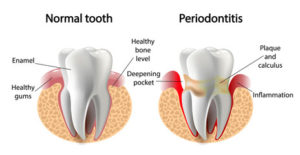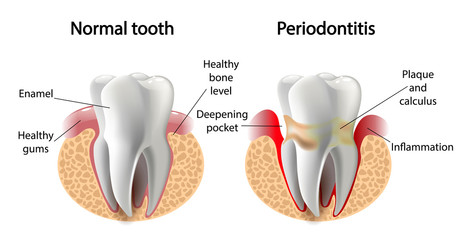What is Considered Advanced Periodontal Disease?
Advanced periodontal disease, otherwise known as periodontitis, is very common among adults, with almost half of Americans aged 30 years old and above have had it according to the Centers for Disease Control and Prevention (CDC). This data translates to more than 64 million people with an increased risk of deep tissue infection and even tooth loss. The good news is that you can decrease this risk with advanced gum disease treatment. Using surgical and non-surgical procedures, you can stop and even reverse the effects of periodontitis and restore your once beautiful and healthy smile.
 What is Advanced Periodontal Disease?
What is Advanced Periodontal Disease?
Gum disease usually starts as gingivitis, which is a bacterial infection caused by persistent plaque. During its early stages, gums become red, sore, and inflamed. You will also notice blood when brushing or flossing. With proper dental care, gingivitis can be easily reversed. However, if left untreated, it can quickly progress to advanced periodontal disease, and lead to bad breath, receding gums, and even tooth loss. It is a highly treatable condition, but the type of treatment you need will depend on the severity of your gum disease.
Non-Surgical Options for Treating Advanced Periodontal Disease
If your particular case of periodontitis is not severe, then non-surgical and less invasive treatments like scaling, root planning, and antibiotics can be enough to give you relief from its unpleasant symptoms.
- Scaling – This is a deep cleaning procedure that is designed to remove plaque and tartar from both beneath and above the gum line.
- Root Planing – Usually performed with scaling, this procedure smoothens the tooth roots to allow for their seamless reattachment to the gums.
- Antibiotics – Your dentist may apply local antibiotics during the cleaning procedure. Oral antibiotics can also help eliminate infections under the gums.
Surgical Options for Treating Advanced Periodontal Disease
If non-surgical treatments are not enough to control the pockets and inflammation brought about by periodontitis, you may have to undergo more invasive procedures like pocket reduction surgery, soft tissue grafts, and bone grafts.
- Pocket Reduction Surgery – Otherwise known as flap surgery, this procedure involves making small incisions of the gums to fold back tissue, allowing easier access for deep cleaning. During this surgery, your dentist can remove harmful bacteria and recontour the tooth roots before stitching the gums back.
- Soft Tissue Grafts – Advanced periodontal disease usually causes a receding gum line, causing loss of strong gum tissue around the teeth. Gums that are damaged beyond repair may require a gum graft from the roof of the mouth to build back the lost strong gum tissue. This procedure can reduce sensitivity, enhance the appearance and protect the teeth.
- Bone Grafts – In severe cases, periodontal disease can lead to severe bone loss around the teeth. In these instances, getting a bone graft can prevent tooth loss and encourage natural bone regrowth. During this procedure, your dentist will surgically put small pieces of bone with growth factors to trigger bone growth.
Periodontal Maintenance for Healthy Gums
After getting treatment for advanced periodontal disease, you must keep your gums healthy through religious periodontal maintenance. Along with regular home care, which includes regular brushing and flossing, your dentist may recommend prescription mouthwash and professional in-office cleanings to check for areas of concern and prevent any more gum problems before they even start.
If you have advanced periodontal disease or you think you might have a gum problem, see a reputable periodontal dentist in your area now. Look for one that is experienced, highly educated, and committed and who will take the time to educate patients on how to properly care for their gums. They should offer both non-surgical and surgical advanced periodontal disease treatments and recommend a maintenance plan that is right for you.





 |
|